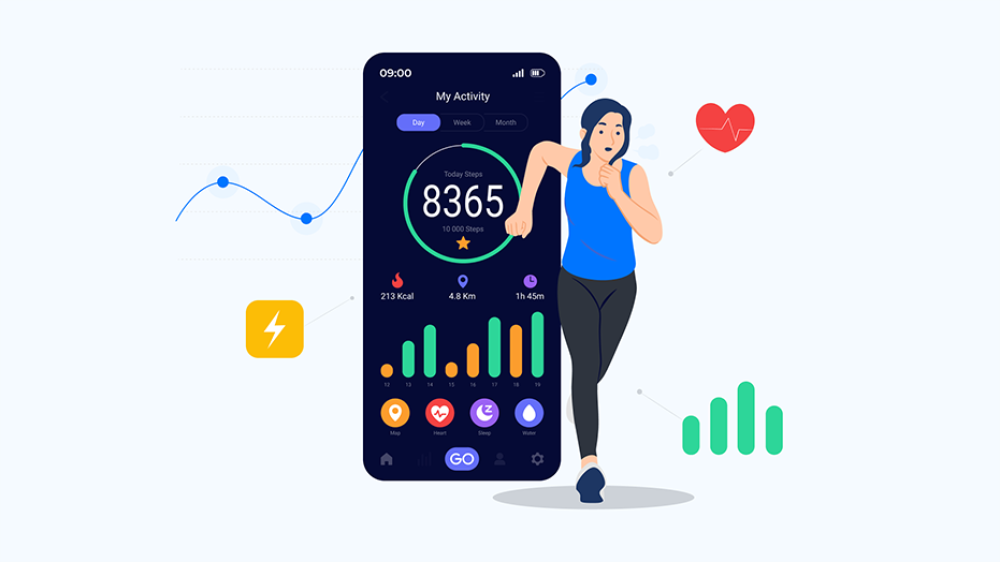In the age of modern technology, health apps have become an essential tool for monitoring and improving our health. From tracking physical activity to monitoring nutrition and sleep, there are many apps that offer advanced features that make it easier for us to reach our health goals. In this article, we will discuss the most prominent of these apps, their advantages and disadvantages, to help you choose the most suitable one for you based on your needs and health goals.
MyFitnessPal
- Features:
- Huge Database: One of the most notable features of MyFitnessPal is its comprehensive database of millions of foods and drinks that can be quickly and easily logged. This allows you to accurately track what you eat.
- Barcode Scanning Capability: By scanning a product's barcode with your phone's camera, you can quickly and accurately add food to your food log, saving you time and effort.
- Integration with other apps: The app allows you to integrate its data with many other health apps such as Fitbit, Apple Health, and Google Fit, making it a comprehensive tool for tracking all aspects of your health.
- Exercise Support: The app not only tracks food, but also allows you to record physical activities like running, cycling, and other exercises.
- Disadvantages:
- Annoying ads: The free version of the app contains ads that may be annoying to some users, which can affect the user experience.
- Manual data entry: Although there is a huge database, some foods may not be added to the app, which requires you to enter the information manually, which may be tiring for some users.
- Unintuitive interface: Some users complain that the app's interface can be confusing, especially for beginners who don't have previous experience using diet tracking apps.
Fitbit
- Features:
- Physical activity monitoring: Fitbit is one of the best apps for tracking physical activity, as it records steps, distance, calories burned, in addition to tracking exercises such as running and cycling.
- Sleep Monitoring: The app tracks different sleep cycles and provides you with detailed reports on your sleep quality. This helps identify factors that may be affecting your sleep and improve it.
- Heart Rate Monitoring: Fitbit provides accurate heart rate monitoring throughout the day, which is important for those who exercise or have special health needs.
- Motivational Notifications: The app provides reminder notifications to do daily activities, such as reminding you to move if you've been sitting for a long time.
- Disadvantages:
- Integration with specific devices: To get the most out of the app, users need to have a Fitbit device that integrates best with the app. Without this device, some data may be inaccurate.
- Free version is limited: The free version of the app is limited to many basic features, while access to advanced features like advanced sleep tracking and accurate health metrics requires a paid subscription.
- Battery and Device Commitment: While the Fitbit app is very useful, the devices may require frequent charging and be less effective if the battery is low.
Health Mate
- Features:
- Integration with Withings Devices: Health Mate is the perfect app for users who own Withings health devices such as a weight scale or blood pressure monitor. The app allows you to easily log your health data from these devices.
- Monitor physical activity and sleep: The app offers tools to track physical activity and sleep, with accurate analytics to improve your lifestyle.
- Detailed Reports: The app provides daily and monthly reports on activity, sleep, and weight data, helping you understand your progress toward your health goals.
- User-friendly interface: The app features a simple and easy-to-use interface, making it easy to keep track of your health activity even if you're not familiar with apps.
- Disadvantages:
- Reliance on Withings devices: To get the best experience from Health Mate, you need to own Withings devices like a weight scale or blood pressure monitor, which can be an additional burden for some users.
- Limited free functionality: Some advanced features in the app require a paid subscription, which may limit your benefit if you prefer not to pay additional fees.
- Limited integration with other apps: Despite being integrated with Withings devices, the app has some limitations in integration with other apps compared to some competitors.
Strava
- Features:
- Advanced level for athletes: Strava is one of the best apps for running and cycling. It provides you with accurate reports on the distance, speed, and elevation gain you covered during your activity.
- Community and Social Interface: The app allows you to share your achievements with friends or even the global community. You can see the results of activities done by others and participate in challenges.
- Advanced Analytics: Strava offers in-depth analytics on your performance, such as breaking down activities into different effort zones and calculating lap pace.
- Challenges and Motivation: The app offers a variety of challenges that you can participate in and achieve specific goals, making it a great motivational tool.
- Disadvantages:
- Free version is limited: While it's excellent at tracking a variety of sports, the free version of Strava doesn't include some advanced features like pattern analysis and advanced performance.
- Social Distraction: Some users may find that social interaction in the app distracts them from their personal health goals.
- Battery consumption: If the app is used to track activities for extended periods of time, users may notice significant battery consumption.
Google Fit
Features:
o Ease of use: Google Fit is a simple app that lets you track your steps, distance, and calories burned with ease.
o Physical activity monitoring: Google Fit offers powerful physical activity tracking features, such as measuring exercise and walking.
o Integration with other apps: Easily integrates with other apps like MyFitnessPal and Strava, allowing you to collect comprehensive health data in one place.
Disadvantages:
o Limited features: Compared to some other apps, Google Fit lacks some advanced features like sleep tracking or continuous heart rate monitoring.
o Limited reporting: Google Fit doesn't offer as granular analytics as some fitness or health tracking apps.
o Limited device support: Google Fit does not support all types of wearable devices, which may limit some users who use other devices.
Conclusion
Health apps vary in their pros and cons depending on the purpose you are using them for. Each app offers its own features that may be ideal for some people while others may not. Therefore, it is important to choose the app that suits your personal needs whether you are looking to improve your physical fitness, track your mental health, or monitor your sleep cycle. Feel free to try different apps and choose the one that suits you best to reach your health goals in the most effective and convenient way.

